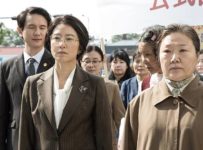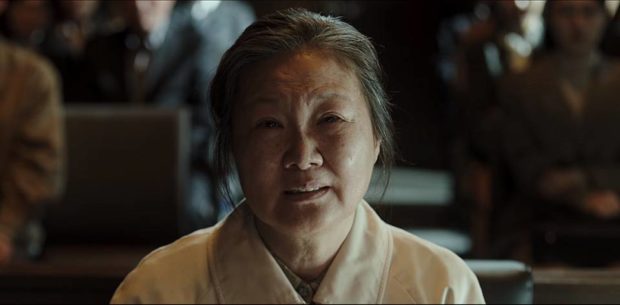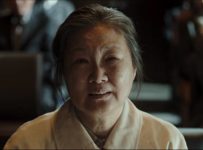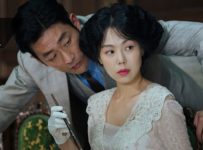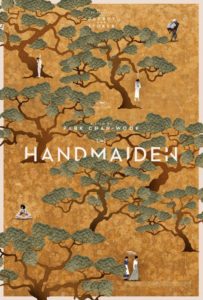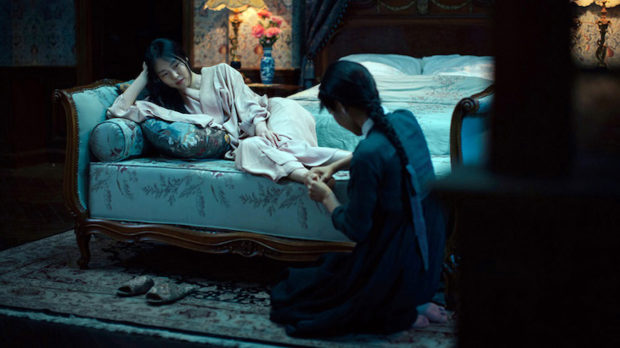Inspired by the ‘Gwanbu Trial’ during the 1990s, HERSTORY (허스토리) follows the struggles of a group of Korean ‘comfort women’ who attempted to attain visibility and an admission of responsibility from the Japanese government. Based on this emotionally fraught story, Min Kyu-Dong’s (The Treacherous, Horror Stories series) film takes place over 6 years, chronicling the 23 trials as the legal battles and fierce debate that surrounded this issue.
‘Comfort women’ is of course the euphemism used for the women forced into sex slavery in the Japanese occupied territories during the Second World War. Last year’s documentary Twenty-Two dealt with the surviving Chinese women who have had to live with this legacy. Min’s fictionalised account of the Korean group action is no less emotionally charged, albeit sometimes deliberately so.
Min (with co-writers Jung Gyeo-woon and Seo Hye-rim-I) structures his story around Busan-based travel agent Moon Jung-Sook (Kim Hee-Ae), who in 1991 is accused of running prostitution tours thanks to a dodgy manager. During her business’ closure, she rallies her Women’s Association to start a local call centre for the group of ‘grannies’ who want to make a case against Japan. During the process, she discovers that her housekeeper Bae Jung-Kil (Kim Hae-Sook) was once a Japanese sex slave. Taking it personally, she and Attorney Lee Sang-Il (Kim Joon-Han) begin a process that takes over a decade to see through.
The Gwabnu Trials were a massively complicated constitutional law matter couched in a history of intergovernmental negotiations that began in 1951. For decades, Japan denied any wrongdoing: in 2007 Shinzō Abe claimed there was no evidence that the Japanese military had used sex slaves. By reducing it to a courtroom drama, Min reminds us of this emotional animosity between nations, and how divisive it remains.
Kim Hee-Ae is fierce as the nominal lead, a lightning rod in the middle of some fine performances from a mixture of veterans. Kim Hae-Sook (Along With the Gods: The Two Worlds) has some very powerful moments, especially breaking down during courtroom speeches, and balancing some difficult truths about her past. Moon Sook (Keys To The Heart) lays herself bare as another ‘granny.’ Lee Yong-Nyeo (Microhabitat) is as nutty as a fruitbat, and while it is an excellent performance, the writing of it steers a little too close to archetype for the film’s own good.
HERSTORY may not be the final word on the Gwanbu Trial, or the broader implications of national moral culpability. In fact, it wasn’t until 2015 that Abe and South Korean President Park Geun-hye reached a formal agreement on the matter. Indeed, recent global border policies around the world remind us that universal human rights appear to be optional depending on who the regime is. If nothing else, films like this hopefully bring us one step close to it never happening again.
[stextbox id=”grey” bgcolor=”F2F2F2″ mleft=”5″ mright=”5″ image=”null”]![]() 2018 | South Korea | DIRECTOR: Min Kyu-Dong | WRITERS: Jung Gyeo-woon, Min Kyu-Dong, Seo Hye-rim-I | CAST: Kim Hee-Ae, Kim Hae-Sook, Ye Soo-Jung, Moon Sook, Lee Yong-Nyeo | DISTRIBUTOR: Cine Asia (AUS) | RUNNING TIME: 121 minutes | RELEASE DATE: 26 July 2018 (AUS)[/stextbox]
2018 | South Korea | DIRECTOR: Min Kyu-Dong | WRITERS: Jung Gyeo-woon, Min Kyu-Dong, Seo Hye-rim-I | CAST: Kim Hee-Ae, Kim Hae-Sook, Ye Soo-Jung, Moon Sook, Lee Yong-Nyeo | DISTRIBUTOR: Cine Asia (AUS) | RUNNING TIME: 121 minutes | RELEASE DATE: 26 July 2018 (AUS)[/stextbox]
